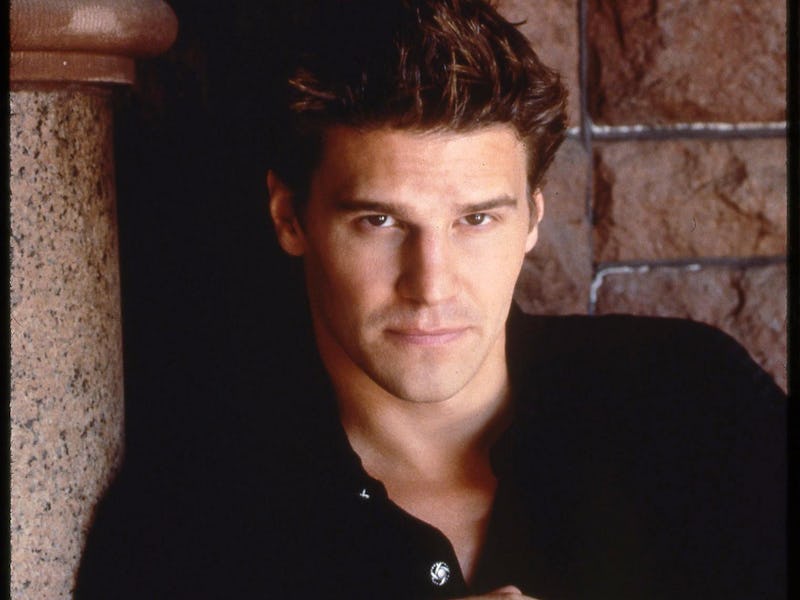5 Reasons 'Angel' is the Best Whedonverse Show
The Buffy spin-off is Joss Whedon's most underrated work.

If you ask any Joss Whedon fan what his best show is, chances are the answer will be Buffy the Vampire Slayer or Firefly. You might find the odd Dollhouse apologist, but a Whedon fan who lauds Buffy spin-off Angel as the cream of the Whedonverse crop is as rare as a vampire with a soul.
This is for many reasons: The fact that it’s a spin-off, the fact that Angel was hardly the most interesting character in Buffy, the fact of Angel’s hair. But if you consider Joss Whedon’s body of television work — which is currently disappearing from Netflix — Angel actually rises to the top. Here’s why:
1. Wesley Wyndham Pryce
Buffy the Vampire Slayer contains amazing character arcs. Anya’s transition from selfish vengeance demon to (relatively) compassionate soul, Spike’s transition from villain to complicated friend and lover, Willow’s evolution from nerdy girl to powerful witch. That being said, nobody on any show — let alone a Whedon show — holds a candle to Wesley Wyndham-Pryce. Throughout all five seasons of Angel, Wesley evolves from bumbling comic-relief nerd to stone cold badass to the most tragic and broken character in a way that is utterly believable. Joss Whedon is known for mixing humor with deep pathos, and nobody exemplifies this more than Wesley. His arc is gutting and heartbreaking, but it’s also an amazing feat of characterization. He’s the very embodiment of the kinds of characters we watch television for.
2. Wolfram & Hart
Although Angel takes several episodes to find its bearings beyond a monster of the week format, it’s worth the wait. Its longest-running antagonist is an evil law firm that begins as a black-and-white foe and evolves into a murky, fascinatingly morally gray entity. In the final season, Angel and his gang even work in it. Whatever role it plays in the story in any given season, Wolfram & Heart was always deviously clever. Few supernatural shows can boast such a long-running adversary that interacts with the plot in such a meaningful way.
3. Faith’s Arc
Faith Lehane is a fan favorite Buffyverse character, as Buffy’s main frenemy. But the most interesting part of her arc — in which she finds her redemption — actually happens in Angel. It’s the shining light in its otherwise weakest fourth season. Specifically in the episode “Orpheus,” Faith and Angel work together beautifully to continue on in spite of their dark pasts. Faith encompasses how Angel is both the darkest and most mature of Whedon’s shows. Characters all flounder and reach their lowest levels and yet always manage to find meaning in the darkness. Angel, as a show, was like Season 6 of Buffy at its best but with more humor and invention.
4. Side Characters
The Whedonverse is peppered with rich side characters. After all, group dynamics are one of Whedon’s strengths. Even so, none are richer and more developed than the side characters of Angel. There’s Lorne the green-skinned lounge singer with family issues who can read your intentions when you sing karaoke. Lindsay, the conflicted good ol’ boy hiding beneath a suit who isn’t as cutthroat as he pretends to be. Lilah, the ruthlessly intelligent lawyer with depth who forms a soft spot for Wesley.
5. Relationships
Happy relationships and the Whedonverse are oxymorons, but Angel is even more morally gray than most. For a time, Wesley keeps his lover Lilah locked in his closet (don’t ask). Cordelia gives up her ideal future to save Angel, who she loves in a complicated way. After the woman he loves dies, Wesley maintains a tortured and toxic closeness with the demon now inhabiting her body (again, don’t ask). If you’re a Whedon fan, you enjoy relationship rollercoasters, and nowhere is the ride crazier than on Angel.
Angel might be leaving Netflix behind in a dramatic billow of its black duster, but as Angel once told Buffy, it’ll be around. It’s out there.